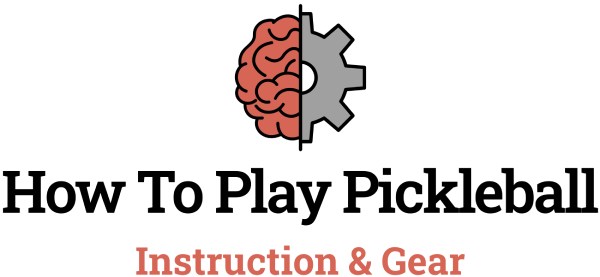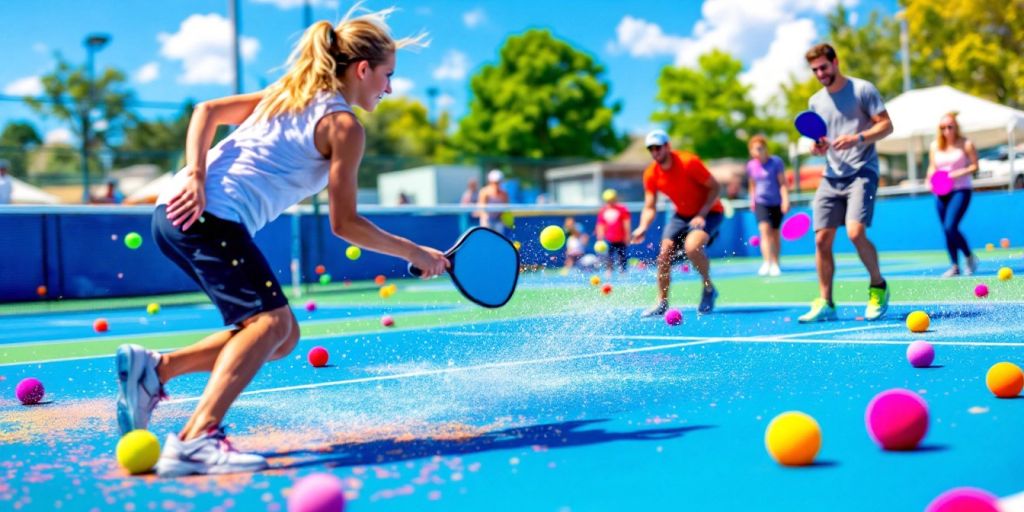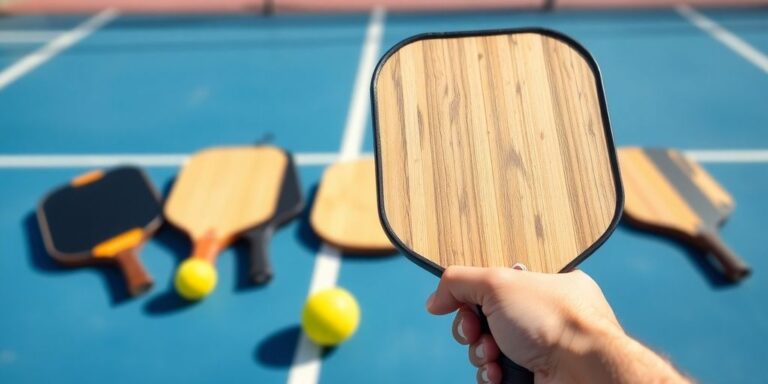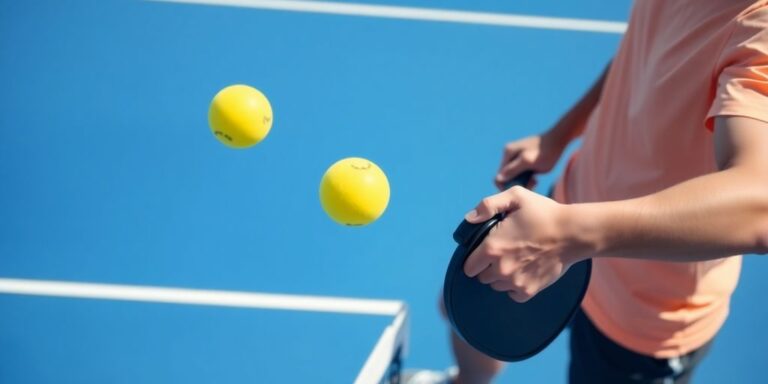Pickleball is a fun and growing sport, but understanding how skill ratings work can be tricky. This guide will help you grasp the different systems used to rate players, making it easier for you to assess your skills and improve your game. Whether you’re a beginner or looking to compete, knowing your rating is important for enjoying and progressing in the sport.
Key Takeaways
- Pickleball skill ratings range from 1.0 to 5.0+, with specific skills defining each level.
- Self-assessment is a great way for casual players to gauge their skills using USAPA sheets.
- Understanding your skill rating helps you compete fairly and set personal goals.
- Different systems like UTPR, WPR, and DUPR exist for more formal ratings, especially in tournaments.
- Improving your rating involves practicing specific skills and playing against others at your level.
Overview of Pickleball Skill Ratings
What Are Pickleball Skill Ratings?
Pickleball skill ratings are a way to measure how good a player is at the game. They range from 1.0 to 5.0+, with 1.0 being for beginners and 5.0 for advanced players. Each rating has specific skills that players need to demonstrate, such as serving, returning serves, and playing at the non-volley zone, also known as the kitchen.
Why Are Skill Ratings Important?
Understanding your skill rating is crucial for several reasons:
- Fair Play: It helps players compete against others of similar skill levels.
- Personal Growth: Knowing your rating allows you to set goals and track your improvement.
- Tournament Entry: Many tournaments require players to have a specific rating to enter.
Different Rating Systems Explained
There are various systems to assess pickleball skills:
- Self-Assessment: Players evaluate their skills using guidelines from USA Pickleball.
- UTR-P: The UTR Pickleball rating is used for competitive play.
- WPR: The World Pickleball Rating is recognized internationally.
- DUPR: The Dynamic Universal Pickleball Rating is a newer, but flawed system gaining popularity.
Understanding these ratings helps players enjoy the game more and improve their skills effectively. Whether you are just starting or have been playing for years, knowing your skill level is essential for a better playing experience.
Self-Assessment for Pickleball Skill Ratings

How to Self-Assess Your Pickleball Skills
Self-assessing your pickleball skills is a great way to understand your current level. Here are some steps to help you:
- Evaluate your skills: Think about your ability to serve, return, and play at the net.
- Use guidelines: Refer to the USAPA self-assessment sheets to see where you fit.
- Be honest: It’s important to rate yourself accurately to ensure fair play.
Using USAP Self-Assessment Sheets
The USAPA provides self-assessment sheets that help players gauge their skills. These sheets include:
- Skill criteria: Specific skills you need to master for each rating level.
- Rating scale: A range from 1.0 to 5.5+ to categorize your skills.
- Feedback: Areas where you can improve based on your self-assessment.
Common Mistakes in Self-Assessment
Many players make mistakes when assessing their skills. Here are some common pitfalls to avoid:
- Overrating yourself: Being too generous can lead to uncompetitive play.
- Ignoring weaknesses: Focus on areas that need improvement, not just strengths.
- Not updating your rating: As you improve, make sure to reassess your skills regularly.
Self-assessment is a valuable tool for every player. It helps you understand your strengths and areas for improvement, making your pickleball journey more enjoyable.
By following these guidelines, you can effectively assess your pickleball skills and work towards improving your game. Remember, honesty is key in this process!
Understanding UTR Pickleball Tournament Player Ratings (UTR-P)
What Is UTR-P?
UTR-P stands for UTR Pickleball Tournament Player Rating. It is a system that helps evaluate a player’s skill level based on their performance in tournaments. This rating is crucial for ensuring fair match-ups in competitive play.
It is the official rating of USA Pickleball and the APP Tour.
How UTR-P Is Calculated
UTPRs are calculated using the results of tournament matches. Here’s how it works:
- Win/Loss Results: Your performance in matches is recorded.
- Opponent Ratings: The ratings of the players you faced are also considered.
- 1-Decimal Rating: This data is used to assign a 1-decimal rating, which is based on a 1-10 scale.
| Skill Level | Description |
|---|---|
| 1.0 | Beginner |
| 2.0 | Novice |
| 3.0 | Low Intermediate |
| 4.0 | Intermediate to Advanced |
| 5.0+ | Advanced to Professional |
Benefits of UTR-P in Tournaments
Having a UTR-P is beneficial for several reasons:
- Fair Match-Ups: Ensures players compete against others of similar skill levels.
- Accurate Seeding: Helps in organizing tournaments effectively.
- Progress Tracking: Allows players to see their improvement over time.
Understanding UTR-P is essential for players who want to compete fairly and improve their game. It provides a reliable way to assess skill levels and ensures everyone has a good experience in tournaments.
In summary, UTR-P is a vital part of the pickleball community, helping players understand their skills and compete fairly in tournaments. As the system evolves, it will continue to play a key role in the sport’s growth.
Exploring the World Pickleball Ratings (WPR)
Introduction to WPR
The World Pickleball Ratings (WPR) is a global system that evaluates players based on their performance in tournaments. It uses a method called the Glicko-2 rating system, which looks at a player’s match history to provide a more accurate skill level.
Differences Between WPR and UTPR
WPR differs from the USA Pickleball Tournament Ratings (UTPR) in several ways:
- Scope: WPR includes both sanctioned and non-sanctioned tournaments.
- Rating System: WPR uses the Glicko-2 system, while UTPR relies on win/loss results.
- Rating Types: WPR provides 4-digit ratings for singles, doubles, and mixed doubles, while UTPR offers separate ratings for different event types.
How to Get a WPR Rating
To obtain a WPR rating, players must participate in tournaments listed on PickleballTournaments.com. Here’s how it works:
- Join Tournaments: Compete in any tournament on the platform.
- Automatic Updates: Your results will automatically update your WPR.
- Check Your Rating: Regularly review your rating to track your progress.
The WPR system aims to create a fair and competitive environment for all players, ensuring that everyone has a chance to showcase their skills.
By understanding the WPR, players can better navigate their pickleball journey and improve their game effectively.
Dynamic Universal Pickleball Rating (DUPR)

What Is DUPR?
DUPR stands for Dynamic Universal Pickleball Rating. It is a global system that evaluates a player’s skills based on their match results. This means it doesn’t matter how old you are or where you play; everyone gets a fair rating. DUPR is designed to change every time you play, giving an up-to-date picture of your skills.
How DUPR Works
DUPR uses a special algorithm to calculate a 4-digit rating. Here’s how it works:
- Match Outcome Impact: Winning against higher-rated players boosts your rating, while losing to lower-rated players can lower it.
- Opponent’s Rating Influence: Your opponent’s rating is crucial; it affects how much your rating changes after a match.
- Margin of Victory or Defeat: The closer the match, the more it can help your rating, even if you lose.
| Match Type | Weight in Rating Calculation |
|---|---|
| Singles | High |
| Doubles | Medium |
| Tournament Play | High |
| Recreational Play | Low |
Advantages of DUPR Over Other Systems
DUPR offers several benefits:
- Fair Ratings: It provides a fair assessment for all players.
- Dynamic Updates: Your rating changes with every match, reflecting your current skill level.
- Inclusivity: It doesn’t consider age or gender, making it welcoming for everyone.
The goal of DUPR is to create a fair and competitive environment for all pickleball players, helping them improve and enjoy the game.
By using DUPR, players can track their progress and see where they need to improve. This system is essential for anyone looking to elevate their game and compete effectively in tournaments.
Improving Your Pickleball Skill Rating
Tips for Beginners
- Practice regularly: The more you play, the better you get. Try to play as often as possible.
- Focus on your footwork: Good movement on the court is key. Always improve your game positioning and movement by practicing returns while moving to different spots on the court.
- Learn the rules: Understanding the game helps you play better. Knowing how to score and the basic rules can elevate your gameplay.
Strategies for Intermediate Players
- Refine your grip and stance: Focus on your grip, stance, and basic strokes, such as serves, forehands, backhands, and volleys.
- Play against better players: Challenge yourself by playing against higher-rated players. This pushes you to improve.
- Take lessons: Consider getting a coach to help you with specific skills and techniques.
Advanced Techniques for High-Level Players
- Analyze your game: Watch videos of your matches to see where you can improve.
- Incorporate advanced shots: Work on shots like spins and dinks to keep your opponents guessing.
- Stay consistent: Practice consistency and accuracy in your shots to reduce unforced errors.
Improving your pickleball skills takes time and effort, but with dedication, you can see significant progress in your game.
Common Challenges in Pickleball Skill Ratings
Dealing with Inconsistent Ratings
Inconsistent ratings can be frustrating for players. Many players find it hard to maintain a steady rating due to various factors such as:
- Different playing conditions (e.g., weather, court surface)
- Varying competition levels
- Personal performance fluctuations
Overcoming Rating Plateaus
Players often hit a point where their ratings don’t improve, known as a plateau. To overcome this:
- Set specific goals for improvement.
- Seek feedback from more experienced players.
- Practice regularly to enhance skills.
Balancing Fun and Competition
Finding the right balance between enjoying the game and competing can be tough. Here are some tips:
- Play with friends to keep it fun.
- Join local leagues for a competitive yet friendly environment.
- Remember that improvement takes time, so enjoy the journey!
Understanding your skill rating is essential, but it’s equally important to enjoy the game. Focus on having fun while you improve your skills!
Pickleball skill ratings can be tricky, and many players face common hurdles. Understanding these challenges is key to improving your game. If you want to learn more about overcoming these obstacles and enhancing your skills, visit our website for expert tips and resources!
Final Thoughts on Pickleball Skill Ratings
In conclusion, understanding pickleball skill ratings is essential for players at all levels. These ratings help you find the right competition and track your progress. Whether you are just starting or have been playing for a while, knowing your skill level can make your games more enjoyable. Remember, being honest with yourself about your abilities is key. This way, you can challenge yourself appropriately and improve your game. As you continue to play and grow in pickleball, keep these ratings in mind to enhance your experience and connect with other players.
Frequently Asked Questions
What are pickleball skill ratings?
Pickleball skill ratings are levels that show how good players are at the game. They help players understand their abilities and find the right competition.
How can I find out my pickleball skill level?
You can figure out your skill level by using a self-assessment chart. This helps you rate your own skills based on what you can do in the game.
What is the difference between UTPR and UTR-P ratings?
UTPR and UTR-P are two different systems for rating players. UTR-P is usually about one point higher than UTPR.
What is a beginner pickleball rating?
A beginner pickleball rating is usually between 1.0 and 2.5. This means the player is just starting out and learning the basics.
Why are skill ratings important in pickleball?
Skill ratings are important because they help players compete against others at a similar level. This makes the game more enjoyable and fair.
How can I improve my pickleball rating?
To improve your rating, practice regularly, play with better players, and learn new techniques.




